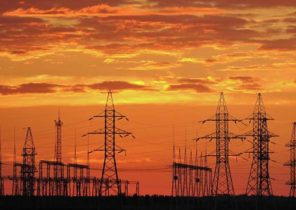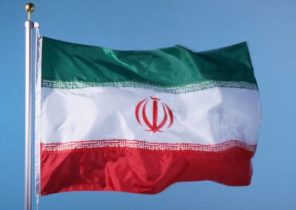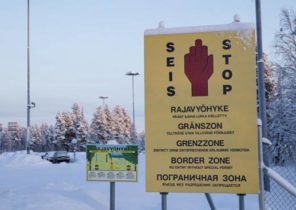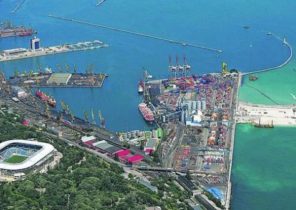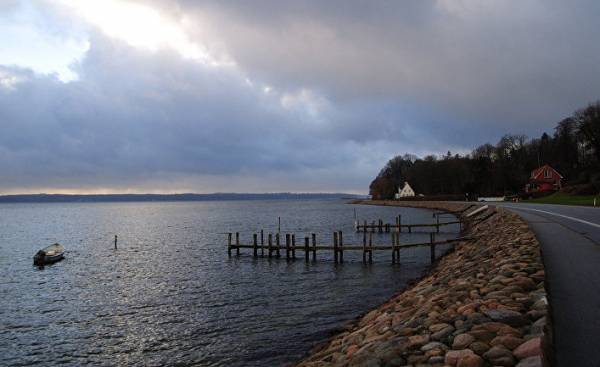
Oil worth $ 60 billion lying under the beautiful Lofoten archipelago. This is an untapped wealth is an existential dilemma for a country that is proud of its policy in the issue of climate change.
When the boat Leif Carlsen (Leif Karlsen), swaying, leaves the port, it shows the house where he was born 63 years ago. Carlsen almost two kilometers deviates from the route, and we admire the majestic, rocky peaks, which are dominant in this part of the Arctic circle, bordering the sea. Then he points to another dwelling: “Here lives my grandmother, she’s 103 years old”.
Carlsen is fishing in the waters of the Norwegian Lofoten Islands since I was 15. The picturesque archipelago, which is a source of pride in a country with abundant natural resources, known for its large populations of Arctic cod, which was the basis of its economy for almost a Millennium.
It’s a bright June day, the season of catching Arctic cod has not begun, and Carlsen goes to sea to catch halibut. He expects a modest catch: “one’s enough for now,” he says in a strong, melodious dialect, shouting over the noise of the engine.
A little departure from the port Laukvik, somewhere a thousand miles from Oslo, he throws a buoy to mark where it begins its tier. “When fishing, you have hot and cold,” he says, gesturing nimble fingers pink color which accentuates his blue overalls and bright Norwegian sea. “Big business took over most of coastal Norway,” he continues, complaining that companies displace small-scale fishermen, buying fishing quotas and using larger vessels.
The mood becomes gloomier. Because the Lofoten Islands are not only the habitat of a huge number of cod and the world’s largest coral reef in cold waters, here under the water lies another resource. The archipelago can be about 1.3 billion barrels of oil equivalent, as well as in the neighboring groups, vesterålen and Senja. At today’s prices is around $ 60 billion.
The dilemma of whether to open access to potential prey, has been the most controversial debates before the parliamentary elections in September. All three major parties — who will score, most likely, about ⅔ of all votes are in favor of so-called impact study, which is usually the first step to drilling operations.
“Simply put, says Carlsen, is a complete idiocy and utter nonsense to begin producing oil here in Lofoten”. He quotes a priest and poet of the 17th century, Petter dass: “No Arctic cod we’ll be here to suffer — it’s like gold.”
The fight for Lofoten, however, is a matter not only of local importance. It is not that other, as struggle for the soul of Norway, for which country she wants to be. For decades the country’s economy and its labor market grew at the expense of oil and gas. It used oil revenues to create the world’s largest sovereign investment Fund, which owns on average 1.3% of every oil and gas company in the world.
New discussion illustrate one inconvenient truth. Preaching about environmental responsibility on the world stage, Norway is one of the largest oil producers. Environmentalists and some people in the business world is accusing the government of hypocrisy because it had supported Paris agreement on climate change, while conducting drilling operations in the Arctic. The duality of the position of Norway became obvious, when at the direction of Parliament’s sovereign investment Fund sold the coal company, while such a solution was also considered for oil and gas companies.
Many argue that such resources, like those found in Lofoten, it is necessary to leave intact. Climate scientists believe that to limit global warming to two degrees Celsius most of the remaining world’s oil must remain in the ground. A study conducted in 2015, University College London, showed that to achieve this goal in the Arctic must not begin the extraction of oil and gas. Many believe that Norway could do more to develop other types to your industry, such as fishing and tourism.
“Lofoten Islands — is the Amazon and the Great barrier reef Norway, says Nina Jensen (Nina Jensen), the head group of ecologists of the world Fund of protection of wild nature in Norway. “This is a unique area. If you can’t leave in this area oil and gas resources, so, for you nothing is sacred. So this fight plays such an important role.”
After two hours on the only highway in Lofoten — straight is only 50 kilometers — you will find yourself in a village called Unstad. The sun disappeared, and the sharp wind of the Atlantic ocean brought heavy rain lashing against the black points at sea — there are about a dozen. This surfers waiting for the wave on one of the northernmost points on the earth.
In 1963 the Norwegian sailors saw surfers in Sydney and decided to try his hand at surfing in Lofoten upon returning home. They made their own boards for surfing, mimicking what is seen on the cover of the album the Beach Boys. Marion Frantzen (Frantzen Marion), a lively daughter of one of those sailors, now manages with her husband a company Unstad Arctic Surf, which provides not only rental services boards and learning to surf, but also rents small houses and runs a cafe. The business quickly grew, and the surfers come here to ride the waves under the summer midnight sun and winter under the Northern lights. “Peaceful it can be here in November, December and may,” she says.
As Carlsen — and like most people in Lofoten — she strongly opposes drilling projects. “I am categorically opposed to oil. We’re just in a panic. They inflate this subject, but for us it’s no good. Most tourists come to Lofoten for nature, for purity. Are we willing to risk it? For what? It’s 100% expresses the identity of Norway.”
Sitting in a cafe, under the patter of rain on the Windows Franzen said about the problems of employment. According to estimates by the Norwegian government, because of oil in this area can annually receive from 400 to 1,100 jobs per year. Everyone with whom I had a chance to speak, horrified by this statistic. “Several hundred jobs, says Franzen. — What the fuck, 400 jobs? I work here 18 people, and it’s a small business.” Carlsen said: “If they leave us alone, we can create much more than 400 jobs]”.
However, Franzen and others quickly dispels expectations of everyone who believes that it is tourism and fishing is an easy alternative to oil. Some locals now believe that they have too many tourists. According to estimates Lofoten tourist centre, the archipelago attracts about a million tourists a year, and live here only 23 thousand people.
“Tension is already so great that, when the threshold is passed, this will be a huge problem. We, as people working in the travel industry dissatisfied. If you go into the local town, to stand in a queue to buy a pint of milk,” says Franzen, obviously a bit exaggerating.
If in the more secluded places in Lofoten you can still hide from people, other parts of the archipelago are invaded by tourists, especially in early summer. Every day the cruise liner Hurtigruten brings in Svolvær, one of the main cities of the archipelago, hundreds of tourists, and rising to Flow, I hear German, French, Swedish speech and dialects from all over Norway. Recently, Franzen saw here also large groups of tourists from Asia.
This situation is evident even in the quiet hamlet of Unstad. Thanks to the Norwegian concept called allemannsrett (right of every human being) tourists can go wherever I want, and even free to put up tents on private land outside the city. During my visit I saw 70 tourists with tents. The problem is in the Onstad — as in most other places — is the lack of public toilets. “No matter where you stopped, everywhere toilet paper. Sheep [which are on the Islands a lot] drink plenty of human shit. This is not the image I want to show the world,” says Franzen.
Difficulties in the infrastructure of the archipelago are connected with the fact that — except for a few roads leading to some of the specific villages — there is only one highway, the E10, connects the island with the Northern part of mainland Norway. Route E10 often thronged with large number of trailers, clogging the roads and flooding the beaches.
As if in proof of this assertion, when we with the photographer the next day went to the South-Western edge of the archipelago, we had to stop suddenly. German busload of tourists pulled off a fairly narrow road into a ditch. Truck companies the help on roads, tries to pull it but in vain. In just a few minutes in both directions accumulate tens machine. As a result, the truck at the time of accepting the defeat, allowing them to drive cars that formed behind him the jam was resolved.
Soon after that, we go to the gallery Tora Assassina (Tor Esaissen), 80-year-old artist, known for her political activism (on the front door there is a poster of “Ask for no oil”, as well as posted warning thrown in a sea of plastic).
“My religion is first and foremost nature,’ he says, looking at the hills on the other side of the road. When I hear talk about oil, it’s all money, nothing but money, and we did not approach true values”. On the question of the damage caused by tourists, he answers seriously: “to Destroy the environment that we live in, then dig the grave themselves. What we are not very smart, so it care about the really important things.”
There are many ideas about what can be done to reduce the devastating impacts of tourism: to introduce a tourist tax, quotas visits to introduce the collection to visitors. Franzen clearly expresses his position: “I believe that we should not take this trip at all. Nature, purity, and value of land — is not for mass tourism”.
***
The fate of the archipelago, most likely, will be solved in Oslo, capital of Norway, it sometimes seems that it separates out the whole world. After weeks spent in the archipelago, where the Sunny weather in a single day gave way to howling wind and torrential rain, leaving at the Oslo airport in a wet June day, you would think that you were in the tropics.
The debate about drilling here, too, are significantly different. At the peak of its development about ten years ago the oil industry was, according to rough estimates, nearly half of all Norwegian exports, and a quarter of the GDP of this country. According to government statistics, the oil industry has brought more than 12 trillion Norwegian kroner (about 91 trillion rubles) in current price terms over the last 40 years, and oil companies invested more than 3 trillion Norwegian kroner in Norway.
No country, except Russia, has behaved so aggressive in the issue of oil in its Arctic region. The current government was forced to keep the ban for the Lofoten Islands, Vesterålen and ségny in the framework of the coalition agreement in the period from 2013 to 2017. But she immediately took up the study for the purposes of oil production in large areas in the Barents sea near the Northern coast of Norway. This year will be a record number of drilling operations in this area in history, and then in 2017, the company will provide 93 new applications for the field (which is also a record).
However, many fields in the Barents sea are located far from existing infrastructure, in relatively deep waters with unknown Geology. Deposits in the sea off the coast in Lofoten, by contrast, is located close to the beach and close to more southern fields in the Norwegian sea.
Oil production in Norway has declined since the beginning of 2000-ies, and this year we predict that production will be nearly half less than in 2001. The number of investments also declined substantially in recent years, decreasing by almost a third since 2013. “The oil sector gave the government a large number of jobs and brought him considerable profit, says Soviknes Terje (Terje Soviknes), the Minister of petroleum and energy of Norway. — Our welfare better than we ever could imagine… the Government is very important to offer oil and gas companies in new fields.”
The question is whether the battle for Lofoten a struggle for the soul of Norway, Soviknes says: “you’re right. It is important to know the history of Norway. We have always been the state, which was based on natural resources: the first is a hydropower and fisheries, and now oil and gas. It became a symbol of controversy about in what direction should develop Norway: should we continue to develop our oil and gas industry or not?”
The current center-right government made some noise about “green shift” of the economy, when oil prices fell, but since they are partly normalized, as Norway’s economy — the rhetoric in support of the oil industry increased. Erna Solberg (Erna Solberg), the Prime Minister of Norway and leader of the conservative party, said that, according to its estimates, the oil and gas industry will be the largest sector of the state is still “10, 20, 30 years.”
Sitting in the office in a medieval fortress near Oslo fjord, she says that drilling in the Lofoten Islands will give the region “jobs of a different kind, which require a higher level of education.” Scenic shore will not necessarily be damaged drilling platforms, some believe that drilling can be arranged with the help of scuba equipment, and in this area Norway is doing well. Solberg also rejects criticism that the government gives preference to the oil industry to the detriment of fishing and tourism. “This artificial division and controversy, because, in my opinion, the oil and fishing industries can coexist,” she adds.
Most politicians and councils in Lofoten, opposed oil. But not the mayor of Vahan, the second largest municipality in the archipelago, Canvas Eivind (Eivind Holst). He cites evaluations which oil in the sea in Lofoten is worth 1.5 trillion Norwegian kroner, and drilling operations will bring to the region, investment in the amount of 150 billion NOK.
“I would like to get an answer. I believe that politicians of Norway will be able to understand where there is opportunity for such work, and where not,” he says.
The largest supporter of start of work in Lofoten is a state-owned oil giant Statoil. Satre the Eldar (Eldar Saetre), the General Director of the company, has caused astonishment among many of the defenders of ecology last year, when he said that the beginning of works in Lofoten “will have a beneficial impact on the climate”. He argued that in the extraction of oil and gas Norway produces less waste than many other countries.
The state Sigue Arne (Arne Sigve Nylund), Executive Vice President of Statoil development and production, expresses a more traditional view. It merely asserts that, in the opinion of the company, should conduct a study of the effects, which include not only the interests of the oil industry and the fishing industry and ecology. “We do not require permission to carry out works, we ask for a study to make the right decision,” he says. He admits that any production in Lofoten could begin at least 20 years.
***
On a warm Sunny April day in Oslo, hundreds of people are protesting, hoping he is still wrong. Shouting “Lo-Ve-Se” (short for Lofoten-vesterålen-Senja), they gathered outside the offices of the opposition labour party, the favorites of the upcoming September elections.
The labour party has long advocated the exploration of oil in the North of Norway as a way of providing jobs in remote areas. This year, however, she spoke in favor of the study of the impact of only one of the three areas in the Lofoten Islands. These deposits are known under the rather bland names, Nordland VI, Nordland VII and Troms II.
The labour party now want to look at only the first of these three which, according to preliminary assumptions, contains two times more oil than the other two. While many smaller parties in the Norwegian Parliament had previously blocked any such possibility, some fear that if the labour party will get enough seats to control the minority government, they can go to the right parties Solberg and Soviknes for support in favour of research impact.
Carlsen argues that seismic tests carried out by the oil industry about ten years ago, scared away the cod, and it took years to fish again came back, although scientists have somehow not been able to prove it. Kjersti, Bush (Busch Kjersti), doctor of science in aquaculture and one of the leaders of the Salt consulting company specializing in issues related to coastal zone, emphasizes that thanks to the Gulf stream, the Lofoten Islands are the warmest part of the Arctic. This increases the amount of algae, which in turn accelerates the growth of fish. According to her, the collection of seismic data or drilling associated with oil production, represent a high risk to wildlife in Lofoten.
Environmentalists also point to polls showing that more Norwegians are hostile to the project of oil production at in Lofoten. A survey of the newspaper Aftenposten showed that 43% of the population opposes the impact study, and 34% of the vote in his favor. The gap to nine points can be mapped with a gap of just one point in the last election of 2013.
“We believed that with the fall in oil prices this pressure stops, says Jensen Fund of protection of wild nature. It turned out exactly the opposite. The pressure began to increase. The Lofoten Islands are easily accessible, they are cheaper than work in the Barents sea, the company much better know the local Geology. Therefore, they act as aggressive. They understand that time is running out”.
This topic obviously is very deep experiences. Jensen and Carlsen fisherman say they are willing to participate in civil disobedience, if in Lofoten will be allowed any work. “I don’t like to protest. But this is the only thing I can sacrifice myself. I’m ready to sit in jail for it,” says Jensen.
There are people who think, however, that the debate about Lofoten is just a big misconception. The Jacobsen frithjof (Frithjof Jacobsen), a columnist for the newspaper VG, argued in January that the debate about Lofoten (being the main “line of the watershed” in politics of climate change in Norway) are far-fetched. They allow politicians to argue about the theoretical questions, not causing anyone any harm, and, more importantly, give the oil companies the distraction of the defenders of the environment from their more important goal — the continuation of drilling in the vast Barents sea. According to Norwegian petroleum Directorate, two-thirds of the undiscovered resources in Norway are located in the Barents sea, potentially they amount to 18 billion barrels of oil.
“The Lofoten Islands should not be sacrificed for oil,” says Truls, Gulowsen (Truls Gulowsen), who heads the office of Greenpeace in Norway. “It is a place that reflects our national identity. This is the heart of the local fisheries, our coastal and mountain regions. So we can’t afford to lose this battle. But at the same time, the oil industry is increasingly expanding field in the North”. Therefore, Greenpeace is suing the Norwegian government on the constitutionality of drilling operations in the Barents sea and leaves others to fight for Lofoten.
Local residents also had concerns in connection with these discussions. Criss Rokkan Iversen (Kriss Rokkan Iversen), the second head of Salt, said that the oil industry has long been portrayed as the “bad wolf”. However, other types of industry also have a negative impact on the amazing wildlife. The increase in navigable areas poses a great threat to fish, she says, and tourism “is already out of control.” Fish farming is also controversial due to the use of antibiotics to combat parasites.
“In Lofoten there is a huge concentration of natural resources. This is the same as the conflict of values, in a geographical conflict. It is associated not only with oil. It is a conflict between different types of industry wishing to use these natural resources,” she says, and calls for impact study that demonstrated the effects of each type of industry on the environment. “We talk about what we want to see Norway in the future,” she adds.
And Lokvice Carlsen pulls out his catch, seven pantusov, his record for a single layer. A few days earlier, when he was returning to port on his boat, he again shared thoughts about the fight against oil.
“We are fighting for their lives. It is surprising that we managed for so long to withstand. Oil will last only for a few years is only a drop in the ocean. While fishing we were doing here for thousands of years,” he says.
He sighs, looking through the endless sea in their fishing grounds: “It is complete idiocy. We have no future with the oil. Oil has its place in the world all understand this, but not here. There are a few places in the world that must be protected, and this place is definitely one of them.”
